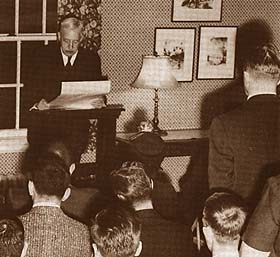|
This is an archived article.
For the latest news, go to the Advance
Homepage
For more archives, go to the Advance Archive/Search Page. |
||
|
Phi Beta
Kappa Chapter Established
During Time of Growth in the 1950s By Mark J. Roy [ Index to UConn History ] Forty-six years ago this week, on April 4, 1956, 18 undergraduates became the first members of the University of Connecticut's chapter of Phi Beta Kappa.
That evening, at the Community House of the Storrs Congregational Church, two juniors and 16 seniors were presented at the first installation ceremony of the new Epsilon chapter of Phi Beta Kappa. The oldest and most prestigious undergraduate honors organization in the United States, Phi Beta Kappa was founded in 1776 at the College of William and Mary. It was in 1941 that Walter Kulp, a professor of bacteriology at UConn, called a meeting of faculty members to consider trying to get a chapter established at the University. Kulp was one of a dozen UConn faculty who had belonged to Phi Beta Kappa chapters at other institutions. The effort to launch a UConn chapter was delayed however, with the start of the World War II, and was not pursued again until 1949. According to the late James Barnett, emeritus professor of sociology, "information ... was submitted in November 1949 to the Committee on Qualifications, but the University was not selected for further study ... The reasons for this decision apparently lay in the fact that the University ... did not offer regular courses in Latin and Greek." Barnett noted in 1980 that "the Committee felt that the proportion of the University's budget devoted to teaching subjects in Arts and Sciences was inadequate and that the housing of departments in this general area was considered poor. "This decision gave the University of Connecticut pause, and angered some," he wrote. Curriculum changes and the burgeoning campus construction program of the early 1950s changed those conditions, however, and in 1952, G. Safford Torrey, a professor of biology and a member of Phi Beta Kappa since 1913, led a renewed effort by faculty to establish a University chapter. "This time," wrote Barnett, "the University of Connecticut was accepted for study and an extended report was submitted, numbering 77 pages, which included the work of several persons." Following an inspection visit in the spring of 1954, the Committee on Qualifications made a favorable recommendation to the Phi Beta Kappa Council - which meets once every three years. Torrey then submitted a formal request to authorize a charter that would establish a chapter. In December 1955, the Council of United Chapters of Phi Beta Kappa granted the request to establish Epsilon Chapter, the fifth Phi Beta Kappa chapter in Connecticut. The others at the time were at Yale, Trinity, Wesleyan, and Connecticut College for Women. The installation of the local chapter came as the University was celebrating its 75th anniversary in 1956. Torrey presided over the ceremony that April 4, and the keynote speaker was William T. Hastings, then-president of the Phi Beta Kappa United Chapters. By coincidence, this year's annual business meeting of the Epsilon of Connecticut chapter of Phi Beta Kappa is this Thursday, April 4 - the 46th anniversary of the first installation ceremony. At that meeting, members will consider new inductees. Last year, 138 new members were inducted: including 124 graduating seniors, 8 juniors, 5 graduate students, and one honorary member. This year's installation ceremony will take place May 5 at Konover Auditorium in the Thomas J. Dodd Research Center. Anne Hiskes, associate professor of philosophy, will deliver the annual Phi Beta Kappa address. |

